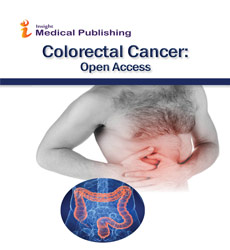Cancer Drugs and Adjuvant Medication Administered Colorectal Cancer
Mikael E. Craanen*
Department of Surgery, Clinical Hospital, Chile.
- *Corresponding Author:
- Mikael E. Craanen Department of Surgery, Clinical Hospital, Chile, Email: Mikael E.Craanen@yahoo.com
Received: November 09, 2021; Accepted: November 23, 2021; Published: November 30, 2021
Citation: Mikael E. Craanen (2021) Cancer Drugs and Adjuvant Medication Administered Colorectal Cancer Vol.7 No.6:1
Introduction
Medication is a cancer treatment that uses anti-cancer drugs that are either injected into a vein or taken orally. These drugs circulate through the bloodstream and reach nearly every part of the body. Medication is frequently used to treat colorectal cancer. Adjuvant medication is administered following surgery. The goal is to kill cancer cells that were left behind during surgery because they were too small to see, as well as cancer cells that escaped from the main colon or rectal cancer and settled in other parts of the body but are too small to see on imaging tests. This reduces the likelihood of the cancer returning.
Cancer drugs for colon or rectal cancer can be administered intravenously (IV) as an intravenous infusion over a few minutes or as an infusion over a longer period of time. This can take place in a doctor's office, an infusion centre, or a hospital, to administer treatment for cancer, a slightly larger and sturdier Code is frequently required in the vein system. Central venous catheters (CVCs), central venous access devices (CVADs), and central lines are all terms for these devices. They are used to deliver medications, blood products, nutrients, or fluids directly into your bloodstream. They can also be used to draw blood for testing purposes. CVCs come in a variety of shapes and sizes. The port and the PICC line are the two main types.
Medication is administered in cycles, each followed by a period of rest to allow you to recover from the effects of the drugs. Cycles are typically 2 or 3 weeks long. The timetable varies according to the drugs used. For example, with some drugs, chemo is only administered on the first day of the cycle. Others give it for a few days in a row or once a week. The chemo schedule then repeats at the end of the cycle to begin the next cycle.
Adjuvant or neoadjuvant medication is frequently administered for a total of 3 to 6 months, depending on the drugs used. The length of treatment for advanced colorectal cancer is determined by how well it is working and what is being treated.
Hand-foot patients may develop during capecitabine or 5-FU treatment (when given as an infusion). It may begin as redness in the hands and feet and progress to pain and sensitivity in the palms and soles. If the condition worsens, the skin may blister or peel, resulting in painful sores. It's critical to notify your doctor right away if you notice any early symptoms, such as redness or sensitivity, so that steps can be taken to prevent things from worsening, neuropathy (nerve damage) is a common oxaliplatin side effect. Numbness, tingling, and even pain in the hands and feet are symptoms. It can also cause extreme cold sensitivity in your throat, oesophagus (the tube connecting your throat to your stomach), and stomach.
When swallowing cold liquids or holding a cold glass, this can cause pain, If you're going to receive oxaliplatin, talk with your doctor about potential side effects ahead of time, and notify him or her right away if you experience numbness, tingling, or other symptoms, Some people may experience allergic or sensitivity reactions while receiving the drug oxaliplatin. Skin rash; chest tightness and difficulty breathing; back pain; or feeling dizzy, lightheaded, or weak are all possible symptoms. If you notice any of these symptoms while receiving chemo, notify your nurse immediately, diarrhea is a common side effect of many of these chemotherapy drugs, but it can be especially severe with irinotecan. It must be treated as soon as possible — at the first sign of looseness.
Open Access Journals
- Aquaculture & Veterinary Science
- Chemistry & Chemical Sciences
- Clinical Sciences
- Engineering
- General Science
- Genetics & Molecular Biology
- Health Care & Nursing
- Immunology & Microbiology
- Materials Science
- Mathematics & Physics
- Medical Sciences
- Neurology & Psychiatry
- Oncology & Cancer Science
- Pharmaceutical Sciences
